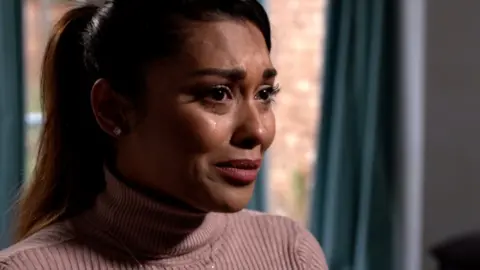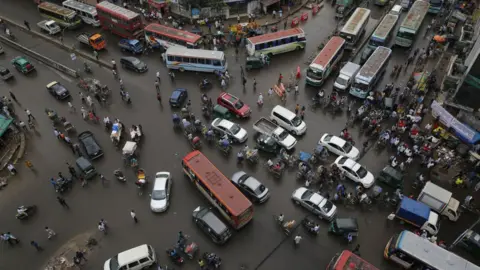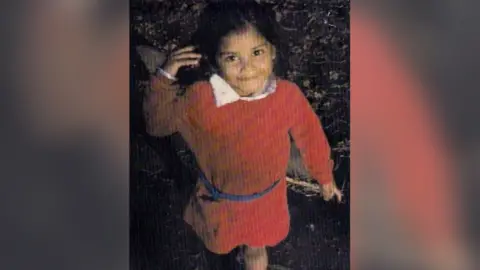Forced marriage law 'could stop victims reporting crime'
Criminalising forced marriage could stop victims from speaking up if their parents are locked up, campaigners say.
While legislation sends a "strong message," a charity working with victims said it also scared off others.
Rubie Marie, 35, who was forced to marry in Bangladesh when she was 15, said: "It is hard because you love your family of course you do... But at the end of the day abuse is abuse."
The Home Office said it was essential victims had confidence to speak out.
Forced marriage became a criminal offence in 2014, but only one case has been brought in Wales since then - with four convictions in total across the UK.
However, the Welsh Government estimates there are up to 100 cases of forced marriage every year.

In 2018, the forced marriage unit - a joint effort between the Foreign and Commonwealth Office and Home Office - gave advice or support in 1,196 UK cases.
Shahien Taj of the Cardiff-based Henna Foundation told BBC Wales Live more prevention work was needed to educate perpetrators, who are often the victims' parents.
The charity said victims often wanted to return to the family home once the situation was resolved.
"I don't know a single victim that I've worked with that has said she's ok with the police coming down on parents like a tonne of bricks - all too often they don't want any intervention because of that," said Ms Taj.
Ms Marie, who now lives in the Midlands, said once she was married, she was raped "more or less, every single day" so her new husband could have a child and a ticket to live in the UK.
 Getty Images
Getty ImagesThe Home Office is consulting on proposals that would legally require those who work closely with young people, such as teachers and social workers, to report suspected cases of forced marriage.
Ms Taj believes forced marriage protection orders are the preferred route - allowing young people to apply to the courts for protection, while keeping the family out of the criminal system.
"We've had eight cases where young women have gone home and been able to move on with their lives," she said.
Samsunear Ali from the charity Bawso said education was key as many parents did not even realise they were breaking the law.
"For them they are doing the right thing and that's the only way they know how to reduce the level of shame in the family that this child could potentially bring.
"It's a huge problem in Wales, and it's still not being talked about as much."
She said there were cases in rural Wales where women had no support and they were at greater risk, with forced marriages potentially "going on for generations and nobody knows about it".

 Rubie Marie
Rubie Marie'I was raped every day'
Rubie Marie was born and raised in south Wales. She had a happy childhood but everything changed once she hit puberty.
She was taken to Bangladesh in 1998 at the age of 15 under the pretence of it being a holiday.
"We were only supposed to go for six weeks but then it went to two months, then it went to three months, then it got to six months and we all got homesick," she said.
"I asked my father, I said we want to go home. I want to go back to school. I want my friends. But he would say things like 'we spent so much money coming here'… That was his excuse, his cover up, his facade to plan what he was planning which was the marriage.
"I was sitting down having dinner with the whole family and he just came in and he sat down and he started to eat and out of the blue, and I remember it like it was yesterday,
"'Wouldn't it be great if we got Rubie married?' And I was mortified. I was a kid and I had a tantrum. I threw my plate on the floor. I started kicking off, banging the doors, ran into my room screaming, shouting. I just didn't know how to comprehend that information.
"I was put on a bidding system. One of my uncles went and started bidding me. It was horrible. I was treated like a slave.
"I was in this alien country - I didn't know where to go, where to turn to, didn't know where there was a phone. Nothing."
'I was disowned'
Ms Marie was forced to marry a man twice her age and for her engagement she was "dressed up like a doll".
"The house was full of laughing people, you know there was people everywhere trying to come into my room to see me, to have a peek at this new bride," she said.
"And I was just sitting there just thinking 'I'm just an object'. You just got to do what you've got to do and that's it. My vision was just get home, do whatever you need to do to get home."
Once she was married, her new husband wanted a child.
"More or less, I'd been raped every single day to get pregnant, so then he's got an official British pathway of coming to Britain because he's got a child. That was their plan," she added.
She got pregnant and came back to Wales to give birth. When the baby was born, she fled: "That brought shame to the family again in their eyes. And I was disowned for a very long time."
Rubie now works as an ambassador, educating people about forced marriage.
"Now I'm speaking and talking to the world and sharing in that way of there is light at the end of the tunnel, there is a place for you in this world.
"It's not all doom and gloom. And it's not hell. You've got to turn it around. You've got to find that strength to turn it around and use it to your advantage and make it a happy place otherwise no one's going to do that for you."

A Home Office spokesman said: "We know that forced marriage is often a hidden crime and so it is essential that victims have the confidence to come forward to get the help they need.
"We are seeking views on whether introducing a mandatory reporting duty might help strengthen protections for victims and ensure more perpetrators are brought to justice.
"The consultation is open to everyone and we are particularly interested in hearing from victims and survivors of forced marriage, and professionals with expertise in the issue of forced marriage."
- For details of organisations that offer advice and support with forced marriage or honour violence, visit BBC Action Line
Watch the full story on Wales Live, on Wednesday, 5 December at 22.30 on BBC One Wales.
